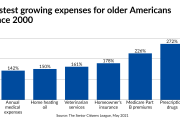“Inflation is always and everywhere a monetary phenomenon.”
Milton Friedman’s famous quote conveys a simple and powerful concept: inflation is caused by too much money chasing too few goods. We have experienced that phenomenon resulting from the wanton printing of money in the U.S. and the U.K. in the 1970s and have witnessed it, more disastrously, in Weimar Germany and in many countries in Latin America over the years.
Once inflation kicks into high gear, it gets ugly fast. Are we headed there now?
The other day, after spending close to $100 filling my tank with gas, I went to my favorite local restaurant, walked past the large “help wanted” sign and sat at the bar. The one person behind the counter was racing up and down to serve the crowd, and when I asked why there were not more people working she told me, “They won’t come back, they are getting more from unemployment.”
An anecdotal example? Yes. But the inability of small service businesses to get staff is widespread and well documented, as are increases in wages. There is also nothing anecdotal about the price of premium gas hovering at $4 or more per gallon.
Back at the bar, my fish serving was smaller than usual — very good, as always, but very small. Then I checked on the price of fresh fish and found it was way up.
Another personal story: Once the lockdown started, I dusted off my little-used bike and started riding with neighbors every morning. I got to like it so much I decided to buy a better bike, only to find very few new bikes to be had. That was a year ago. I called the bike shop the other day and they have no idea when they will start to get inventory again.
I understand that the initial lockdowns here and elsewhere disrupted economies and supply chains, but a year later we are still waiting, and there are very significant commodity shortages to this day. Bought any lumber lately?
Different this time?
We are now seeing the loosest fiscal and monetary policy in U.S. history. In 2021 there’s been substantial growth in the money supply as the Fed buys $120 billion of bonds every month.
Yet many have argued that it is different this time, that forces like globalization and technology have changed the game. The Fed also says that while inflation is happening now, it will be “transitory.” In other words, that it will go away as the economy sorts out its post-pandemic reopening kinks.
Really?
With a new world of global trade and technology, a lingering post-pandemic, work-from-home culture and so many other disorienting changes happening so rapidly, who really knows if the old rules apply? Who knows if running the government printing presses to the tune of trillions of dollars of new money will
Will the dollar remain strong and new supplies of everything suddenly appear as we stop seeking higher wages, and rents and gas and grocery prices fall, and housing prices stop rising?
Or do we wake up one day to accept the fact that the prices of most of what we need are going up and it is time once more to demand a raise in pay?
In case of inflation...
I don’t have the answer, but I am not feeling very good about this. And should Milton Friedman’s maxim hold true for this moment in history, here is how I am preparing my clients.
For openers, I advise them to enjoy the strong rally in value stocks and small stocks.
I tell them that, as disciplined investors, they rebalanced last year by selling off some of the big tech stocks that had risen so much to restore the right balance between large and small, growth and value, domestic and international equities — and that they are now reaping the rewards of that discipline.
I explain that inflation, rising interest rates and a reopening economy can benefit small and value stocks — the ones that were hurt the most by the shutdown.
And that loose fiscal and monetary policies can lead to a weaker dollar and exposure to international assets can provide a hedge against that possibility.
I say that no one knows what comes next, but we do know that broad diversification provides important protection against many risks and that rebalancing back to your target mix keeps you from becoming too concentrated in one area.
Finally, I counsel them that if we do end up with continued inflation, some assets will do better than others, and that discipline will ensure they don’t miss the opportunities.







